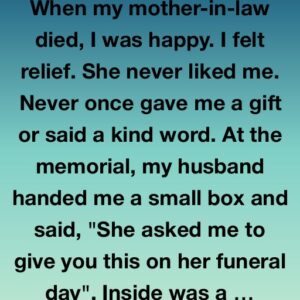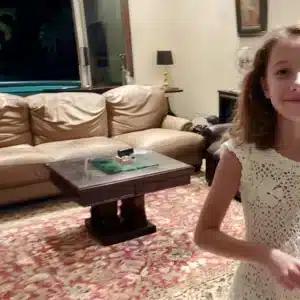For two months, the nursery was our heartbeat. I painted the walls a soft, earthy sage and hand-stenciled clouds that drifted just above the crib. My back ached, my ankles swelled, but I wanted our baby to dream under something I’d made with love. When we set the crib in place, Evan’s eyes went glassy. “Our little family,” he whispered. I wish I’d filmed that—for evidence.
The day everything shifted, I was at a routine prenatal checkup when a text from Evan popped up: Can we talk when you get home? Mom’s not doing great. I walked into our kitchen to find him pacing, eyes skittering anywhere but mine.
“Mom called Dr. Wills,” he blurted. “He thinks she’s lonely and depressed. He recommended she stay close to family for a while.”
“How close?” I asked, even though his guilt had already answered the question.
He fiddled with his keys, his phone, even the salt shaker. “I thought… maybe she could use the nursery. Just temporarily.”
“Come again?”
“Babies don’t sleep in cribs for months,” he rushed on. “We’ll put a bassinet in our room. She needs comfort. And she’d be nearby to help.”
“You want to put your mother in our baby’s room?”
“Temporarily,” he repeated, and then, quieter, “She’s already here.”
I walked down the hall, hand shaking on the nursery knob. The rocking chair was gone. In its place: a queen-size bed draped in Lydia’s floral comforter. Her jewelry box sat perched on the changing table like a smug little throne. She ended a call and beamed. “Anna! Don’t you love what we’ve done with the space?”
“Where’s the crib?” My voice came out paper-thin.
“Evan moved it to the corner,” she said, breezy as a spring day. “I won’t be in your way.” Her smile didn’t reach her eyes. “And those clouds are cute, but a bit childish for a guest room, don’t you think? I was telling Susan a more mature palette would be nice.”
“It’s not a guest room,” I said as evenly as I could. “It’s temporary.”
“Of course, dear.” A pat on my arm, the kind you give a child who doesn’t know any better.
Evan hovered in the doorway, contrite and useless. He’d missed my appointment to check a “weird noise” in Lydia’s car, and while I was being screened for preeclampsia, he moved our baby out of his own room. I reminded him we had a guest room. He muttered something about it being “uncomfortable” and promised we had time.
“No,” I told him, “you have time. I have a human about to claw his way out of my body.” He flinched. I said I wouldn’t pretend to be happy. He nodded like a man asking the ocean to be a little less wet.
That night, our son kicked me awake, furious, like he knew his space had been stolen. On my way to grab a heating pad, I passed the cracked nursery door and heard Lydia’s voice, lilting with triumph. “You should’ve seen her face when she walked in! Like someone died.”
I went still, breath trapped behind my ribs.
“No, no, it was easier than I thought,” she continued. “I told Evan I was showing signs of depression. Poor boy practically begged me to move in. Men are so simple if you press the right buttons. His wife has no idea about my next step.”
Heat surged up my neck.
“The best part? She can’t complain without looking heartless. Who kicks out a depressed mother-in-law? I’ve got months before that baby comes. By then, I’ll be so established here they’ll forget whose house this was first.”
My vision blurred. She laughed softly, then added, “The doctor thing was genius. I called his office, asked some questions about seasonal depression. Took those talking points right to Evan. Sometimes I amaze myself.”
I backed away, heart pounding, and told Evan what I’d heard. He blinked, defensive. “That’s not… she wouldn’t.”
“She did,” I said. “Word for word.”
“She gets dramatic with Susan,” he argued weakly. “She probably exaggerated.”
“She conned you, Evan. She used a fake diagnosis to take our baby’s room.”
He went quiet, staring at a place just past my shoulder, where denial still looked easier than truth.
In the morning I called my aunt Carla, who has the energy of a retired sheriff and the precision of a choir director. “We need proof,” she said, producing a baby monitor with audio recording. “If she wants theater, we’ll give her a microphone.” We tucked it on the nursery bookshelf before Lydia returned from her latte in the garden.
That evening, while Evan worked late, I watched the feed. Lydia stretched across the queen-size bed, phone in hand, purring to her friend. “The nursery plan is perfect. Evan feels so guilty about my ‘depression’ he’s bending over backward. I’m going to redecorate this room piece by piece—starting with those ridiculous clouds. Tomorrow I’ll suggest converting the basement into the nursery. For ‘safety.’ Better climate control.”
My jaw ached from clenching. I saved the file.
“We’re going to therapy,” I told Evan over breakfast.
“What?”
“Couples therapy. Today. I booked it. Your other option is explaining to my father why his pregnant daughter is moving home.” He knew my dad. He came quietly.
Dr. Patterson listened without blinking. Then she turned to Evan. “You sound responsible for your mother’s emotions. When did that start?”
“Always,” he said softly. “If she’s upset, I fix it.”
“And Anna? Where does her emotional wellbeing fit?”
His mouth opened. Closed.
“Who taught you your mother comes before your wife?”
“No one,” he murmured. “She raised me alone. I owe her.”
“You owe her love and respect,” the therapist said, kind but firm. “Not your marriage.”
We drove home in silence, the air thick with new vocabulary: boundaries, enmeshment, primary family. In the driveway I said, “Ask her to move to the guest room. Tonight. Or I’m going to my dad’s.”
He found Lydia in the kitchen constructing a feast impressive enough to distract a jury. “Mom, we need to talk,” he began, voice unsteady. “You’re moving to the guest room. Anna needs the nursery.”
Her face rearranged itself: confusion, hurt, warning. “Darling, I’m finally stable here. Moving me could trigger a relapse. Dr. Wills emphasized a consistent environment.”
I pressed play on my phone. Her recorded voice poured into the room: The doctor thing was genius… I took those talking points right to Evan… Sometimes I amaze myself.
The color drained from her cheeks. She lunged for my phone. Evan caught her wrist. “Stop,” he said, and the word sounded like a door locking.
“How long have you been recording me?” she hissed.
“Long enough to know you plan to take our basement, too,” I said. “And that my taste is ‘juvenile.’”
Evan’s shoulders squared. “Pack your things,” he told her. “Guest room for now. Two days, then you’ll leave.”
Teary pleas. Accusations. A clutching of the chest so dramatic it bought her an ER visit and a clean bill of health. By the end of forty-eight hours, Evan had moved every piece of furniture back. He rebuilt the crib like he was trying to rebuild trust—slowly, carefully, with hands that shook.
“I’m sorry,” he said, tightening the final screw. “I’m so damn sorry.”
“Why did you believe her?” I asked, folding tiny onesies that might as well have been prayers.
“Because I’ve never been allowed to say no,” he admitted. “Even as a kid, keeping her happy was my job.”
“What about keeping me happy?” I asked, and it wasn’t a jab; it was a plea.
He looked at my belly, at the painted clouds, at the future we’d nearly fumbled. “Our family is right here,” he said. “I know that now.”
Lydia left the next morning with minimal theater—my father arrived to “help with the transition,” a quiet mountain in a plaid shirt. At the door, Evan said, “We’ll revisit visits after the baby’s born—when you’re ready to respect boundaries.” She muttered, “You’ll regret this,” but her heart wasn’t in it. The show had closed.
Afterward, I stood in the doorway and breathed the room back in. The crib was where it belonged. The rocking chair waited by the window. The clouds hovered patiently, exactly where I’d imagined our son would first learn the shape of dreams.
Evan slipped his arms around my middle and rested his hands over our baby. “Our baby’s room,” he whispered.
“Our baby’s room,” I echoed.
Some lessons arrive like a storm you never wanted. Ours taught us that marriage isn’t the absence of conflict—it’s choosing the right battles and standing shoulder to shoulder when they come. We set the bassinet beside our bed that night, the monitor blinking softly on the dresser, and let the stillness settle. Somewhere above us, paint dried on little clouds, and for the first time in weeks, I felt the room exhale.





